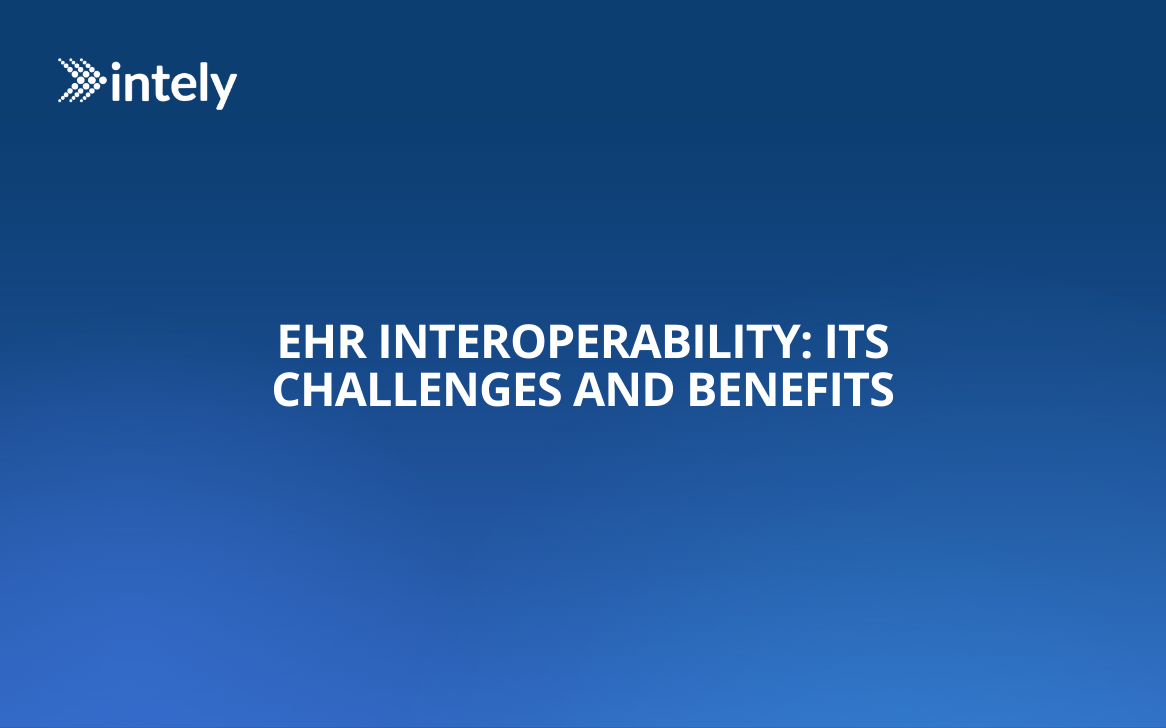What’s New with intely: May Roundup
Here are the highlights of all the content we have posted in the past month. We hope this will give you a sense of what intely is all about, and you'll feel…
Electronic Health Records (EHRs) are a core component of healthcare. However, despite their functional efficiency, they are marred with many challenges.…

Electronic Health Records (EHRs) are a core component of healthcare. However, despite their functional efficiency, they are marred with many challenges. Antiquated and standardized systems of record are slowing down the growth of the healthcare sector.
The interoperability difficulties being faced by the healthcare sector are being addressed by adopting an API-led healthcare strategy. API-driven healthcare solutions are gaining popularity among hospitals, physicians, insurance companies, pharmaceutical companies, and patients.
Providers are finding that adopting healthcare data standards can help them overcome interoperability challenges. In this blog, we'll discuss EHR interoperability and its challenges and benefits to the healthcare industry.
EHR interoperability is the ability to transfer medical records and other healthcare information from one system to another. When EHRs are interoperable, they can work hand-in-hand with other cloud-based programs. This will enable different providers to seamlessly share patient data.
Every healthcare provider who uses EHRs knows how beneficial they are, especially if they are interoperable. Here are some of its benefits.
Interoperability gives physicians and other healthcare staff access to patient data whenever they need it, wherever they are. As a result, doctors can treat their patients better at any point of care.
Like any other relationship, communication makes everything better. With improved healthcare communication, we can expect increased provider and patient satisfaction.
Interoperable EHRs help in making healthcare operations more efficient. With EHR interoperability, patients' data is available to all the caregivers who need specific patient-related information.
Interoperable EHRs reduce repetitive tests, image orders, and lab draws. Also, patients gain better control over their health data and can more easily retrieve it when needed. Administrative duties for collecting patient data from multiple sources are lessened.
Listed below are the biggest challenges that healthcare providers face concerning EHR interoperability.
Implementing effective healthcare data integration is quite expensive. Small healthcare organizations may have a hard time integrating EHRs with other systems.
Intely offers EHR integration at a price that you can afford. You can choose which plan suits your organization best.
Providers conform to a standard set of HL7 FHIR API resources. However, workflows and connections are still non-standard. Also, there is no standardized guide on EHR integration. So, vendors need to set up integration channels to connect to different endpoints for each resource and system of record.
intely provides standard connectivity to major EMR and EHR systems using HL7 FHIR APIs and EMR specific APIs. The user can choose a templated use case or create a custom workflow from a front-end interface using drag-and-drop configuration.
Implementing an automated interoperability solution is quite complicated. Most integration vendors do not provide a plug-and-play model with a template configuration to solve use cases, resulting in poor repeatability and scalability.
Intely offers reliable no-code/low-code solutions with templated configuration to solve use cases. To facilitate seamless and repeatable integration, we created standard connections and templated workflows.
Integration vendors like intely can provide you with standardized EHR interoperability solutions.
Intely removes the time-consuming and complicated process of implementing integration solutions. We make integration easy – Drag, drop, done.
Here at intely, we promote EHR interoperability. Our solutions allow EHR systems to be tightly integrated with other system applications.
Interested in how Intely can integrate your EHRs to your other software applications? Visit intely.io to learn more.
EHR interoperability is the ability to transfer medical records and other healthcare information from one system to another. When EHRs are interoperable, they can work hand-in-hand with other cloud-based programs, enabling different providers to seamlessly share patient data.
EHR interoperability is crucial because it allows for seamless sharing of patient data between different healthcare providers, improving patient outcomes, enhancing doctor-patient communication, increasing operational efficiency, and reducing administrative duties.
Interoperability gives physicians and other healthcare staff access to patient data whenever they need it, wherever they are. This allows doctors to provide better treatment to their patients at any point of care.
Intely addresses several key challenges:
Intely offers various pricing plans tailored to fit the needs of different healthcare organizations, making EHR integration more accessible and cost-effective.